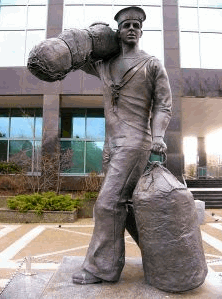Bring Back the Draft?
by Brandon Fuller During the 1960s and early 70s, economists--including Milton Friedman of the University of Chicago--made a strong case for ending the draft, the government practice of forcing people to join the military. Those who supported the draft at the time argued that an all-volunteer military would be far too expensive. Eliminating conscription would force the military to pay higher wages in order to attract young men. Higher pay would cripple the military, especially during Vietnam.
During the 1960s and early 70s, economists--including Milton Friedman of the University of Chicago--made a strong case for ending the draft, the government practice of forcing people to join the military. Those who supported the draft at the time argued that an all-volunteer military would be far too expensive. Eliminating conscription would force the military to pay higher wages in order to attract young men. Higher pay would cripple the military, especially during Vietnam.The response from Friedman and other draft opponents? Sure, the draft lowers the budgetary cost of building up a military, but only at a massive opportunity cost. Those who join the military because of the draft or the fear of being drafted do so against their will. Most draftees (if not entirely opposed to military service) would require a higher level of pay in order to enlist as a true volunteer. Conscription forces people into service at lower pay than they would otherwise earn. That is, draftees pay a conscription "tax" in order to finance the nation's military build-up. The conscription tax is equal to the difference between the pay draftees would earn in the absence of the draft and the military pay they earn because of it. Better, according to Friedman, to abolish the draft altogether and have all tax payers bear the costs of maintaining an army of soldiers who voluntarily accept their posts and pay.
Draft opponents won the day Congress allowed the law authorizing the draft to expire on June, 30 1973. Why, then, is Charles Wheelan--another University of Chicago economist--calling for a return to conscription? Read his latest Yahoo! Finance column to find out.
As Wheelan points out, moral hazard occurs when people behave differently--and sometimes recklessly--because they don't bear the full costs of their actions. Mountain climbers may take riskier routes because they know there's a good chance search and rescue can find them if they get stranded. Insured drivers may exercise less caution because their policy reduces the cost of getting in an accident. Auto insurers address moral hazard by requiring deductibles--a sum that the driver must pay on a claim before the insurance kicks in. If drivers understand that they'll pay the first $1,000 for any damages from an accident, they may drive a bit more cautiously.
Wheelan applies this theory to U.S. foreign policy, arguing that an unintended consequence of the all-volunteer army is that it makes the electorate more likely to support U.S. military involvement in overseas conflicts.
1. Wheelan proposes a modified draft. In what ways is his proposal like the deductible on your auto insurance policy? Do we need another conscription tax to put a check on our troop commitments in times of humanitarian crisis?
2. How is deficit financing (issuing government bonds instead of collecting taxes) like the moral hazard problem surrounding foreign intervention and invasion by the U.S. military?
3. In what way is Wheelan's proposal subject to the same criticism Friedman leveled against the draft nearly 40 years ago?
4. Despite enlistment bonuses and aggressive recruiting, the U.S. military has had difficulty increasing manpower during the Iraq war. Politicians and the electorate cannot decide to invade or intervene if would-be soldiers won't enlist. Do you think the free market for military labor that Friedman championed provides enough of a check on the moral hazard of a volunteer army? Or do you agree with Wheelan that some form of conscription is needed to discourage hazardous decision making?
To read more about the role economists played in ending the draft, click here.
Labels: Deductible, Insurance, Moral Hazard, War



0 Comments:
Post a Comment
<< Home